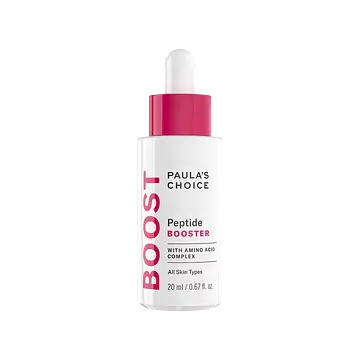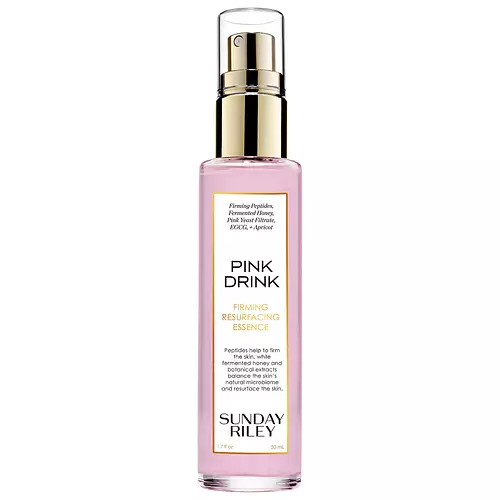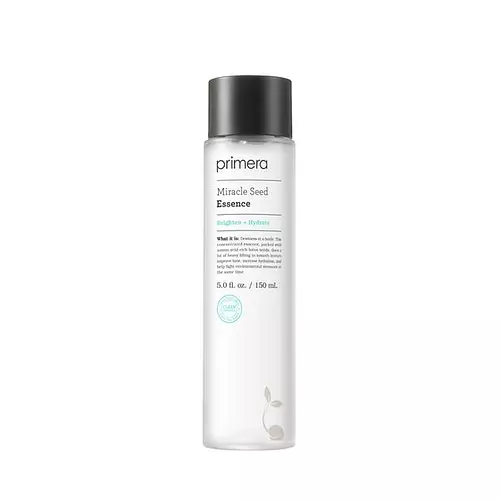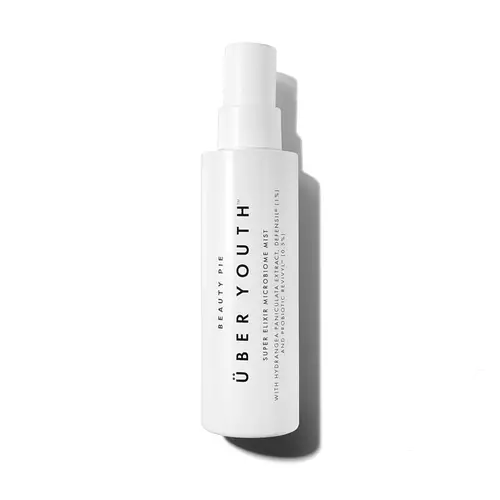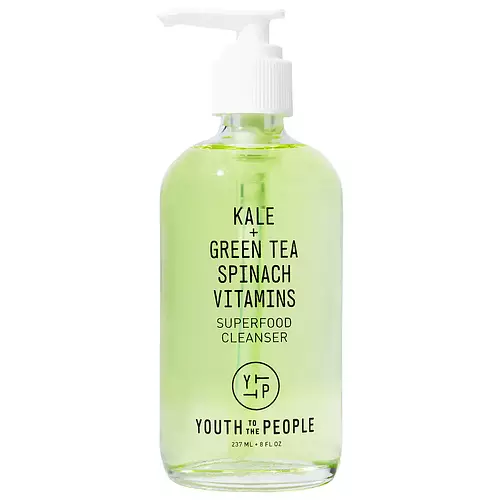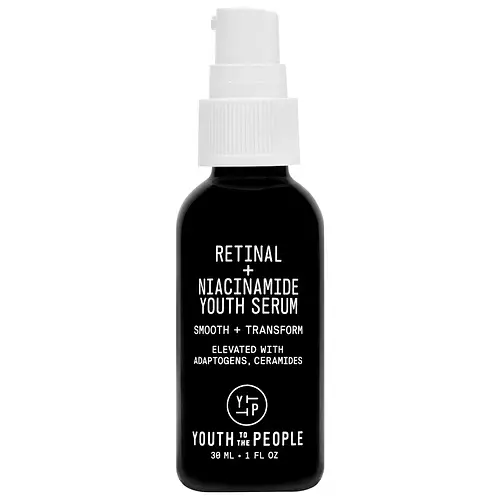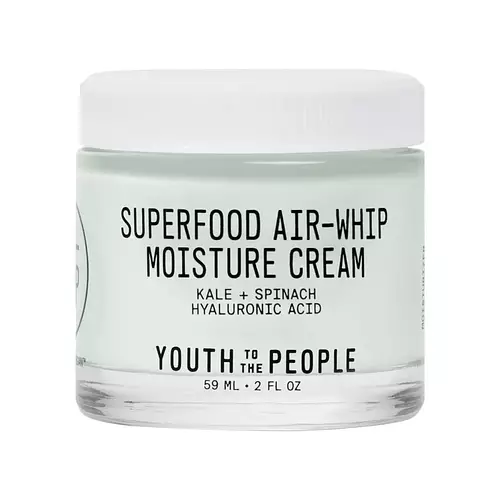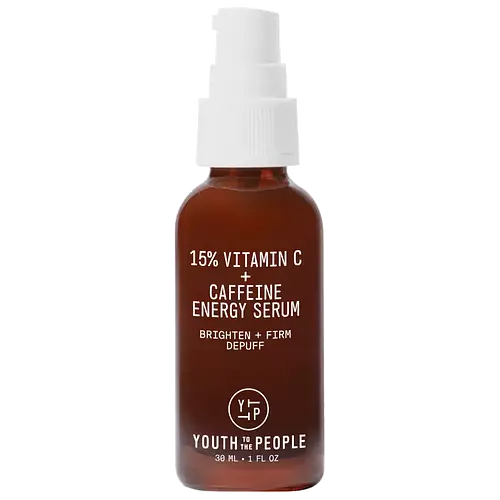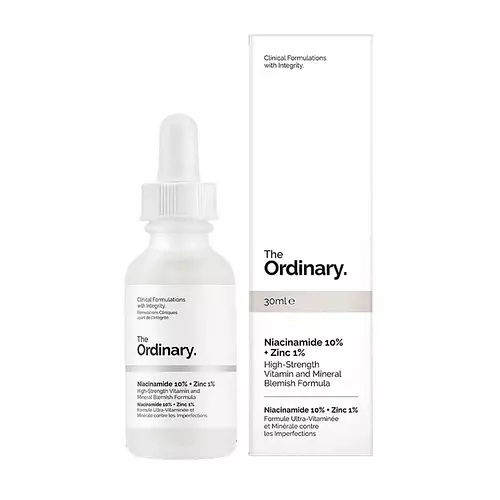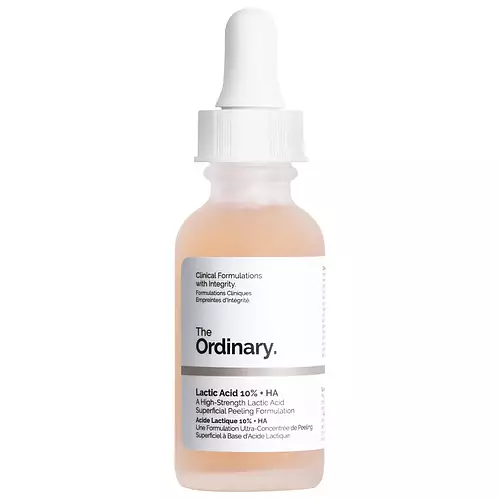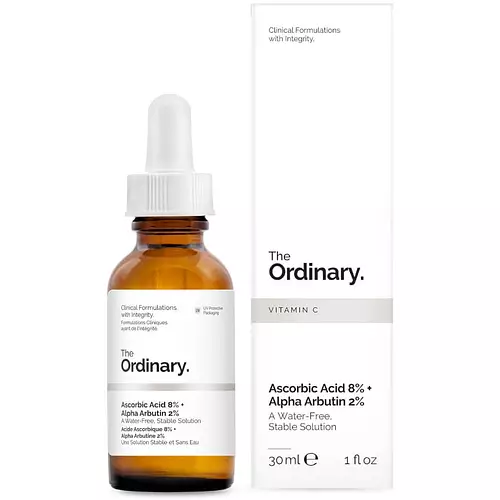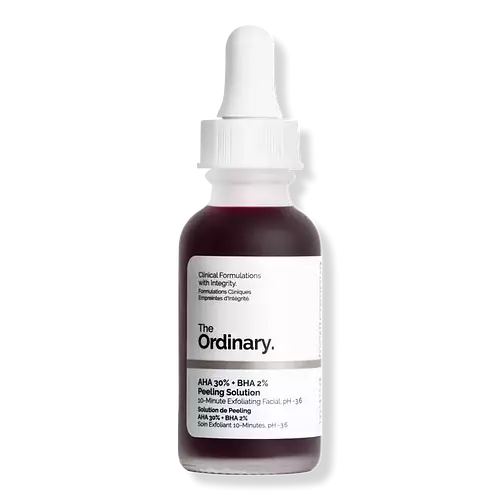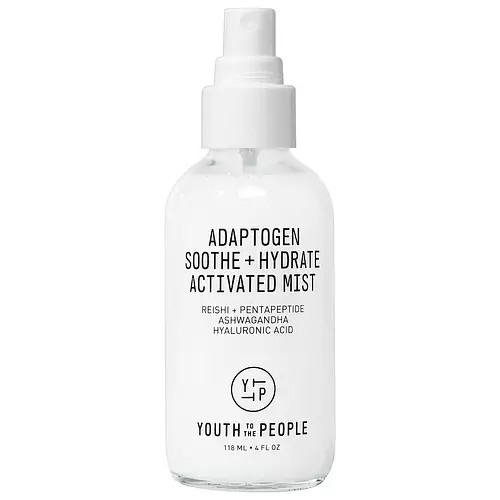
Youth To The People Adaptogen Soothe + Hydrate Activated Mist with Peptides Ingredients Explained
Updated on September 18, 2023 Submitted by Jnke.
Overview
What it is
Facial treatment with 23 ingredients that contains AHA, hyaluronic acid and peptides
Cool Features
It is cruelty-free and reef safe
Suited For
It has ingredients that are good for anti aging, dry skin, brightening skin, sensitive skin, reducing pores, scar healing, dark spots and better texture
Free From
It doesn't contain any harsh alcohols, common allergens, fragrances, oils, parabens, silicones or sulfates
Fun facts
Youth To The People is from United States. This product is used in 48 routines created by our community.
We independently verify ingredients and our claims are backed by peer-reviewed research. Does this product need an update? Let us know.
Facial treatment with 23 ingredients that contains AHA, hyaluronic acid and peptides
Quick info
You should know
Notable Ingredients
This product contains 1 ingredient that may have this attribute:
This product contains 1 ingredient that may have this attribute:
This product contains 1 ingredient that may have this attribute:
Benefits
This product contains 3 ingredients that may have this attribute:
This product contains 2 ingredients that may have this attribute:
This product contains 2 ingredients that may have this attribute:
This product contains 1 ingredient that may have this attribute:
This product contains 1 ingredient that may have this attribute:
This product contains 1 ingredient that may have this attribute:
This product contains 1 ingredient that may have this attribute:
This product contains 1 ingredient that may have this attribute:
This product contains 2 ingredients that may have this attribute:
Concerns
This product contains 1 ingredient that may have this attribute:
This product contains 1 ingredient that may have this attribute:
This product contains 1 ingredient that may have this attribute:
This product contains 1 ingredient that may have this attribute:
Ingredients 23
Water. It's the most common cosmetic ingredient of all. You'll usually see it at the top of ingredient lists, meaning that it makes up the largest part of the product.
Propanediol helps absorb ingredients into your skin, boosting their benefits. It can act as an emollient, making your skin softer. Propanediol can help products last longer by boosting the properties of preservatives within the formulation.
Aloe Barbadensis Leaf Juice comes from leaves of the aloe plant. Aloe Barbadensis Leaf Juice is best known for helping to soothe sunburns. It is also anti-inflammatory, moisturizing, antiseptic, and can help heal wounds.
Hydrogenated Lecithin is created from the hydrogenation of lecithin. Hydrogenation is a chemical reaction between molecule hydrogen and another element.
Butyrospermum Parkii Butter is a plant lipid from the fruit of the Shea Tree. It is an effective skin hydrator and emollient.
Phenethyl Alcohol is a colorless and aromatic alohol. It is naturally occuring in essential oils.
Ethylhexylglycerin (we can't pronounce this either) is commonly used as a preservative and skin softener. It is derived from glyceryl.
Maltodextrin is a polysaccharide. It is derived from starch such as rice, corn, wheat, or potato starch.
Xanthan gum is used as a stabilizer and thickener within cosmetic products. It helps give products a sticky, thick feeling - preventing them from being too runny.
Betaine is a common humectant (a substance that promotes retention of moisture). It's known to be gentle on the skin and can help balance hydration.
1,2-Hexanediol is a multi-tasker ingredient. It acts as a preservative to increase shelf-life and can aid other preservatives in preventing microbe growth. 1,2-Hexanediol also helps the skin retain moisture as a humectant.
Caprylyl Glycol is a humectant and emollient, meaning it attracts and preserves moisture.
Potassium Sorbate is a preservative used to prevent yeast and mold in products. It is commonly found in both cosmetic and food products.
Glycerin is already naturally found in your skin. It helps moisturize and protect your skin.
Withania Somnifera extract comes from the Winter Cherry plant, or the Ashwaganda plant.
Lactic Acid is an AHA that is derived from fermenting lactose, a carbohydrate from milk. It removes the top layer of old and dead skin cells and helps increase cell turnover.
Sodium Hyaluronate is hyaluronic acid's salt form. It is commonly derived from the sodium salt of hyaluronic acid.
Phenoxyethanol is a preservative that has germicide, antimicrobial, and aromatic properties. Studies show that phenoxyethanol can prevent germ and microbial growth. By itself, it has a scent that is similar to that of a rose.
Sodium Benzoate is a preservative. It's used in both cosmetic and food products to inhibit the growth of mold and bacteria. It is typically produced synthetically.
Water, Propanediol, Aloe Barbadensis Leaf Juice, Pentapeptide-59, Hydrogenated Lecithin, Butyrospermum Parkii Butter, Phenethyl Alcohol, Ethylhexylglycerin, Maltodextrin, Ganoderma Lucidum Extract, Xanthan Gum, Betaine, 1,2-Hexanediol, Caprylyl Glycol, Potassium Sorbate, Glycerin, Withania Somnifera Extract, Ocimum Tenuiflorum Extract, Rhodiola Rosea Extract, Lactic Acid, Sodium Hyaluronate, Phenoxyethanol, Sodium Benzoate
Ingredient Ratings
Based on the number of likes and dislikes each ingredient has received.
Ingredients Explained
Water. It's the most common cosmetic ingredient of all. You'll usually see it at the top of ingredient lists, meaning that it makes up the largest part of the product.
So why is it so popular? Water most often acts as a solvent - this means that it helps dissolve other ingredients into the formulation.
You'll also recognize water as that liquid we all need to stay alive. Talk about multi-purpose! If you see this, drink a glass of water. Stay hydrated!
Learn more about WaterPropanediol helps absorb ingredients into your skin, boosting their benefits. It can act as an emollient, making your skin softer. Propanediol can help products last longer by boosting the properties of preservatives within the formulation.
Propanediol is not likely to cause sensitivity and considered safe to use.
It is derived from corn or petroleum with a clear color and no scent.
Learn more about PropanediolAloe Barbadensis Leaf Juice comes from leaves of the aloe plant. Aloe Barbadensis Leaf Juice is best known for helping to soothe sunburns. It is also anti-inflammatory, moisturizing, antiseptic, and can help heal wounds.
Aloe is packed with good stuff including Vitamins A, C, and E. These vitamins are antioxidants, which help fight free-radicals and the damage they may cause. Free-radicals are molecules that may damage your skin cells, such as pollution.
Aloe Barbadensis Leaf Juice also contains sugars. These sugars come in the form of monosaccharides and polysaccharides, folic acid, and choline. These sugars are able to help bind moisture to skin.
It also contains minerals such as calcium, 12 anthraquinones, fatty acids, amino acids, and Vitamin B12.
Learn more about Aloe Barbadensis Leaf JuicePentapeptide-59 is a peptide.
Hydrogenated Lecithin is created from the hydrogenation of lecithin. Hydrogenation is a chemical reaction between molecule hydrogen and another element.
Hydrogenated Lecithin is an emollient and emulsifier. As an emollient, it helps soften skin by trapping moisture within.
The phospholipids in Hydrogenated Lecithin can produce liposomes. Liposomes help other ingredients get through the skin barrier to be better absorbed.
As an emulsifier, it prevents oil and water ingredients from separating.
Learn more about Hydrogenated LecithinButyrospermum Parkii Butter is a plant lipid from the fruit of the Shea Tree. It is an effective skin hydrator and emollient.
Emollients help soothe and soften your skin. It does this by creating a protective film on your skin. This barrier helps trap moisture and keeps your skin hydrated. Emollients may be effective at treating dry or itchy skin.
Shea butter is rich in antioxidants. Antioxidants help fight free-radicals, or molecules that may harm the body. It is also full of fatty acids including stearic acid and linoleic acid. These acids help replenish the skin and keep skin moisturized.
While Shea Butter has an SPF rating of about 3-4, it is not a sunscreen replacement.
Shea butter may not be fungal acne safe. We recommend speaking with a professional if you have any concerns.
Learn more about Butyrospermum Parkii ButterPhenethyl Alcohol is a colorless and aromatic alohol. It is naturally occuring in essential oils.
The scent of this ingredient is floral and often compared to rose.
Like other alcohols, this ingredient helps prevent the growth of bacteria. However, its main purpose is to impact a fragrance.
Learn more about Phenethyl AlcoholEthylhexylglycerin (we can't pronounce this either) is commonly used as a preservative and skin softener. It is derived from glyceryl.
You might see Ethylhexylglycerin often paired with other preservatives such as phenoxyethanol. Ethylhexylglycerin has been found to increase the effectiveness of these other preservatives.
Maltodextrin is a polysaccharide. It is derived from starch such as rice, corn, wheat, or potato starch.
In food, Maltodextrin is used to improve the texture and thicken a product. Due to its structure, it can help create a gel texture. As an emulsion stabilizer, it helps keep the ingredients in a product together.
As a polysaccharide, Maltodextrin has moisturizing properties. Polysaccharides are a type of carbohydrate. The top layer of skin uses polysaccharides to retain water, keeping the skin hydrated.
Maltodextrin is water soluble and has a sweet taste.
Learn more about MaltodextrinThis is the extract of the Reishi mushroom.
The Reishi mushroom has antioxidant, anti-inflammatory, and antimicrobial properties.
This is due to its content of terpenoids, polysaccharides, macronutrients, and phenolic acids.
Learn more about Ganoderma Lucidum ExtractXanthan gum is used as a stabilizer and thickener within cosmetic products. It helps give products a sticky, thick feeling - preventing them from being too runny.
On the technical side of things, xanthan gum is a polysaccharide - a combination consisting of multiple sugar molecules bonded together.
Xanthan gum is a pretty common and great ingredient. It is a natural, non-toxic, non-irritating ingredient that is also commonly used in food products.
Learn more about Xanthan GumBetaine is a common humectant (a substance that promotes retention of moisture). It's known to be gentle on the skin and can help balance hydration.
Betaine is best for improving hydration and soothing irritated skin. Studies show betaine may help with uneven skin tones.
Betaine is naturally created in the skin and body. The form found within cosmetic products can be either plant-dervied or synthetic.
Learn more about Betaine1,2-Hexanediol is a multi-tasker ingredient. It acts as a preservative to increase shelf-life and can aid other preservatives in preventing microbe growth. 1,2-Hexanediol also helps the skin retain moisture as a humectant.
In products that are water-based, this ingredient can help stabilize perfumes and fragrances. It can also help make the texture of products softer and more smooth.
Caprylyl Glycol is a humectant and emollient, meaning it attracts and preserves moisture.
It is a common ingredient in many products, especially those designed to hydrate skin. The primary benefits are retaining moisture, skin softening, and promoting a healthy skin barrier.
Though Caprylyl Glycol is an alcohol derived from fatty acids, it is not the kind that can dry out skin.
This ingredient is also used as a preservative to extend the life of products. It has slight antimicrobial properties.
Learn more about Caprylyl GlycolPotassium Sorbate is a preservative used to prevent yeast and mold in products. It is commonly found in both cosmetic and food products.
Potassium sorbate is potassium salt derived from sorbic acid. Sorbic acid is a natural antibiotic and effective against fungus.
Potassium sorbate and sorbic acid can be found in baked goods, cheeses, dried meats, dried fruit, ice cream, pickles, wine, yogurt, and more.
Potassium sorbate is often used with stronger preservatives.
Learn more about Potassium SorbateGlycerin is already naturally found in your skin. It helps moisturize and protect your skin.
A study from 2016 found glycerin to be more effective as a humectant than AHAs and hyaluronic acid.
As a humectant, it helps the skin stay hydrated by pulling moisture to your skin. The low molecular weight of glycerin allows it to pull moisture into the deeper layers of your skin.
Hydrated skin improves your skin barrier; Your skin barrier helps protect against irritants and bacteria.
Glycerin has also been found to have antimicrobial and antiviral properties. Due to these properties, glycerin is often used in wound and burn treatments.
In cosmetics, glycerin is usually derived from plants such as soybean or palm. However, it can also be sourced from animals, such as tallow or animal fat.
This ingredient is organic, colorless, odorless, and non-toxic.
Glycerin is the name for this ingredient in American English. British English uses Glycerol/Glycerine.
Learn more about GlycerinWithania Somnifera extract comes from the Winter Cherry plant, or the Ashwaganda plant.
Ashwaganda contains many antioxidant compounds such as Vitamin C, caffeic acid, and ferulic acid.
Ongoing studies show ashwaganda to prevent damage from UV-B radiation.
Learn more about Withania Somnifera ExtractOcimum Tenuiflorum Extract comes from the holy basil plant.
Holy basil has antibacterial, antifungal, and anti-inflammatory properties. It naturally contains fragrances such as linalool.
Holy basil is rich in vitamins A and C, calcium, zinc, and iron.
Learn more about Ocimum Tenuiflorum ExtractWe don't have a description for Rhodiola Rosea Extract.
Lactic Acid is an AHA that is derived from fermenting lactose, a carbohydrate from milk. It removes the top layer of old and dead skin cells and helps increase cell turnover.
Benefits of Lactic Acid are that it can help to reduce large pores and reduce the effects of aging. Some potential downsides are that it can be bad for dry skin, cause irritation, worsen eczema, and worsen rosacea.
Not only does it help exfoliate the skin, it helps strengthen the skin's barrier. When applied, lactic acid helps the skin create ceramides.
Lactic acid is an over-the-counter chemical exfoliant that comes from the fermentation of lactose — a carbohydrate found in milk.
Legend has it that Cleopatra used to bathe in sour milk to help reduce wrinkles.
Read more about some other popular AHA's here:
Learn more about Lactic AcidSodium Hyaluronate is hyaluronic acid's salt form. It is commonly derived from the sodium salt of hyaluronic acid.
Like hyaluronic acid, it is great at holding water and acts as a humectant. This makes it a great skin hydrating ingredient.
Sodium Hyaluronate is naturally occurring in our bodies and is mostly found in eye fluid and joints.
These are some other common types of Hyaluronic Acid:
Learn more about Sodium HyaluronatePhenoxyethanol is a preservative that has germicide, antimicrobial, and aromatic properties. Studies show that phenoxyethanol can prevent germ and microbial growth. By itself, it has a scent that is similar to that of a rose.
It's often used in formulations along with Caprylyl Glycol to preserve the shelf life of products.
Sodium Benzoate is a preservative. It's used in both cosmetic and food products to inhibit the growth of mold and bacteria. It is typically produced synthetically.
Both the US FDA and EU Health Committee have approved the use of sodium benzoate. In the US, levels of 0.1% (of the total product) are allowed.
Sodium benzoate works as a preservative by inhibiting the growth of bacteria inside of cells. It prevents the cell from fermenting a type of sugar using an enzyme called phosphofructokinase.
Sodium Benzoate is the salt of benzoic acid. Foods containing sodium benzoate include soda, salad dressings, condiments, fruit juices, wines, and snack foods.
Studies for using ascorbic acid and sodium benzoate in cosmetics are lacking, especially in skincare routines with multiple steps.
We always recommend speaking with a professional, such as a dermatologist, if you have any concerns.
Learn more about Sodium BenzoateCompared With
Here are some products that it's often compared with
More Youth To The People Products
See all Youth To The People productsMore Facial Treatments
See all facial treatmentsWe're dedicated to providing you with the most up-to-date and science-backed ingredient info out there.
The data we've presented on this page has been verified by a member of the SkinSort Team.
Read more about us

